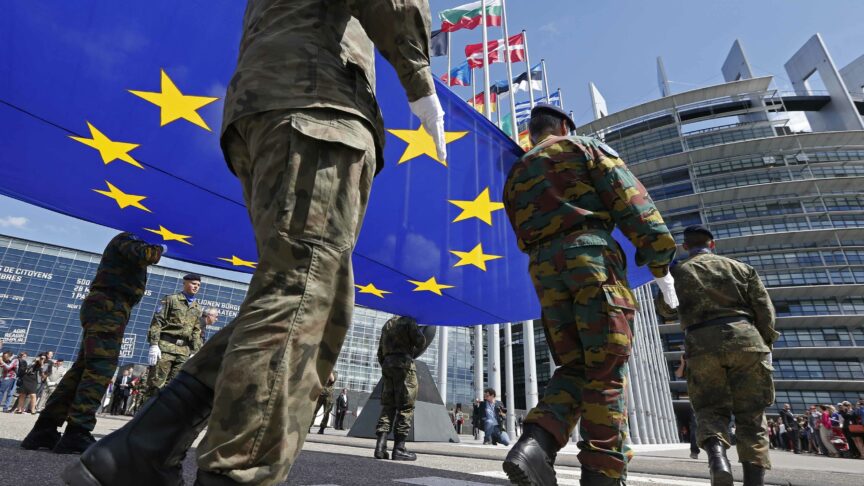Why Scotland looks like the canary in the independence coal mine
Many of the trends seen in the Scottish referendum campaign have more to do with politics of the future than of the past.
This article is an updated version of a piece first published in Reuters.
Scotland has spoken. The pro-Union camp overcame a last minute surge of the independence movement to achieve a convincing victory of 55-45 percent in the referendum. The key to this was a mix of hope and fear: on the one hand, former Prime Minister Gordon Brown announced a major package of constitutional reform to show that a “No” vote would result in major constitutional change rather than the status-quo. On the other hand, the last few days of the campaign saw a mobilisation of business and others to point to the economic risks.
But although the “No” side won, we should recognise that it has been the “Yes” campaign that has done more to shape the agenda of Scottish politics. Scotland’s drive to independence has been interpreted by many as a throwback to ancient identity politics – but many of the trends on display in the Scottish referendum have more to do with the politics of the future than those of the past.
So far, the commentary has focused on whether a “Yes” vote in Scotland would have had resonance among other minorities in search of statehood – from Catalonia and Flanders to Taiwan and Quebec.
But the truth is that the political trends in Scotland are also reshaping many nations that do not face imminent break-up – from America to Zambia.
I would point to four trends in particular:
1. SELF-GOVERNMENT WILL INCREASINGLY TRUMP ECONOMICS
The Unionist “No” camp stressed all of the economic benefits of being part of the union as well as the uncertainty about the future of a Scottish currency as well as Scottish membership of the European Union and NATO. The week before the election hwas full of talk of dangers to Scotland’s financial services industry from independence (several banks just announced that they would relocate their headquarters to London). The UK treasury estimates that Scots received between 14 percent and 16 percent more in public spending per head than people in the rest of the United Kingdom.
However, many of these arguments paled into insignificance when compared to the power of their pro-independence “Yes” camp’s argument that Scotland has not voted for a Conservative government since 1935 and yet has spent more than half of the last century being governed by Conservatives (at the last election, David Cameron’s Conservative Party won only one out of 59 seats in Scotland). As Owen Jones argued in the Guardian, “to most Scots, living under a Tory-led government seems absurd, like being forced to live under a hostile foreign occupying force”.
These sentiments are increasingly felt across the world. Despite casting ballots, people still feel unrepresented. In the European elections, populist parties from the Front National in France to Syriza in Greece argued that though people could change the government, they can not change the policies that shape their larger world. It is a feeling applies to all countries that feel battered by uncontrollable global forces, however valid elections may be in their own backyards.
2. NATIONALISM WILL INCREASINGLY CLAD ITSELF IN PROGRESSIVE CLOTHING.
Rather than proclaiming far-right ideas, pro-independence campaign videos painted a picture of Scotland’s future as a socialist utopia – a British version of Sweden. The campaign video counterposes Scottish fairness with Britain’s growing inequality; Scottish public spending against British austerity; Scottish opportunities against the tyranny of English privilege; and Scottish internationalism with the ‘illegal wars’ of former Prime Minister Tony Blair’s Britain. For the “Yes” campaign, the yes box on the the ballot paper did not just imply that Scots will be free from Tory government – it was an invitation to join in building a socialist paradise north of the border.
The power of the Nationalists’ argument is that it is only partly powered by historic grievances and the nostalgia of Braveheart — kilts, tartan, and the Gaelic language. This path has also been followed by many other nationalist parties in Europe that are seeking to rebrand themselves in order to widen their appeal. The success of these campaigns, according to pollster Peter Kellner, is that they are a political expression of the economic trends highlighted by Thomas Piketty in his best-selling book Capital. They are an effort to stave off the spiraling growth of inequality.
3. ELITES ARE NOT AS PERSUASIVE AS THEY USED TO BE.
At the beginning of the campaign, most thought that the “No” camp would benefit from the fact that all the mainstream parties in Westminster and most British businesses oppose independence. Rather than fighting each other, the Labour Party, the Liberal Democrats, and the Conservative Party worked together to pour cold water on the idea of independence and narrow the political choices available to the Scottish National party.
This spanned from joint statements that Scotland would not be able to use the pound as its currency to a decision last week to cancel Prime Minister’s Questions in order to allow all three parties to campaign in Scotland.
But, as the campaign went on, it became clear that the “Yes” campaign had drawn a lot of its energy from opposing this elite consensus. They argued that the “No” campaign had colluded with vested interests to spread fear and talk down the Scottish people.
The leader of the Scottish National Party, Alex Salmond, was able to present himself as a defender of the Scottish people against the British elites. His arguments had added force because so many successful Scottish people have chosen to make their careers in London – allowing the Nationalists to become the spokespeople for those who have been left behind.
The dynamics of the Scottish campaign are increasingly true of many other democracies where established parties huddle together to defend the current order from insurgent political forces that paint themselves as popular tribunes in the face of entrenched elites.
4. THE IDEA OF “ONE NATION” IS DEAD.
In spite of the legal decision of the referendum, Scotland is already de facto independent. It was striking that none of the (English) leaders of the mainstream parties in Westminster were seen as legitimate voices in Scotland’s debates. The most powerful arguments for the Union came from Scottish politicians.
This is not surprising given the fact that the Scottish have consumed different media from the rest of the UK for a number of years, and that their political arguments have long been different from those in other parts of Britain.In many ways, the cultural and intellectual secession of Scotland from the UK has been going on for a number of years. And it echoes The Big Sort that has seen people in many established democracies clustering into like-minded groupings that live and work and pray together while consuming media that reinforce their bias and preferences.
The results of the Scottish vote will raise lots of issues for the future constitutional shape of Britain, but this will do more to strengthen the legal union of Great Britain and Northern Ireland. Nevertheless, in spite of the result of this week’s vote, I fear we will find that across the world, where people once celebrated their ties to one another, they will increasingly dream of independence.
The European Council on Foreign Relations does not take collective positions. ECFR publications only represent the views of their individual authors.


